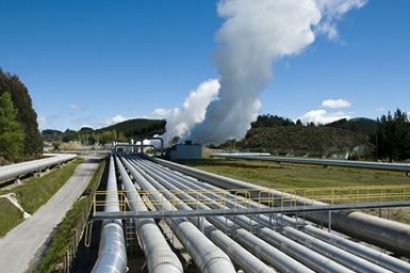
The first project will see GNS Science work with The University of Auckland to develop practical ways to extract high-value minerals from geothermal fluids.
The project received funding of $230,000-a-year for two years in the latest science funding round announced this week by the Ministry of Business, Innovation and Employment.
Rather than injecting ‘waste’ geothermal fluids from power stations back into the ground, the project team is aiming to gain commercial value from fluids, which would make geothermal energy more sustainable and more attractive to investors.
Geothermal fluids are laden with minerals in suspension such as lithium, silver and gold and scientists estimate that many thousands of tonnes of metallic minerals are injected back into the ground near power stations annually.
“An area of great potential is the extraction of lithium from thermal waters, which is feasible from New Zealand’s geothermal resources, and has application for use in batteries,” said project spokesman Greg Bignall of GNS Science.
Lithium is also used in the manufacture of specialist glass products and as a light-weight alloy in manufacturing.
“While there is similar work underway internationally, notably in the United States, New Zealand’s unique geothermal environment offers exciting possibilities requiring a tailored methodology,” Bignall said.
The project will identify simple cost-effective processing technologies for mineral extraction. It will also provide greater understanding of the economic viability, market drivers, and regulatory framework likely to influence the successful implementation of such technologies.
“In the future, industry will explore for new and deeper geothermal resources, and it will need modelling software that can accommodate higher temperatures and pressures, and geochemical regimes that don’t exist at shallower depths,” Bignall said. “We’ll open the door to commercial operators by developing a methodology that can be readily adopted.”
Geothermal production companies, regional councils, Maori trusts, regional development groups support the project. The project’s goal is to create a new industry for New Zealand that has tangible economic, social, and environmental benefits.
In a second project, GNS Science and The University of Auckland have won funding to develop new, integrated numerical modelling software that will aid resource development decisions, and support long-term sustainable management of New Zealand’s geothermal energy resources.
It will receive funding of $1.1 million-a-year for four years. The new open-source software will be more effective than existing geothermal simulation modelling tools in promoting environmentally sustainable and efficient energy generation.
“Existing geothermal modelling software must accommodate complex physical-chemical conditions and processes, but existing modelling tools have limitations” Bignall said.
“In the future, industry will explore for new and deeper geothermal resources, and it will need modelling software that can accommodate higher temperatures and pressures, and geochemical regimes that don’t exist at shallower depths,” he said.
The four-year project will develop integrated geophysical, chemical and flow simulation modelling software, to better understand heat transfer to and between geothermal systems, and to more reliably model production effects on geothermal fields.
The project team will validate its new software by applying it to known geothermal systems in the Taupo Volcanic Zone.
The project has support from New Zealand’s major geothermal developers, Waikato and Bay of Plenty Regional Councils, and involves collaboration with numerical modelling specialists from the US and Switzerland. There is also support from several iwi groups with geothermal interests.
“Not only will the new software be more efficient and more reliable, it will help significantly to reduce field development risk for geothermal energy companies,” Bignall said.
The new software will integrate seamlessly with existing geothermal research in New Zealand, and will provide new insights that will significantly advance knowledge about the hydrology and hydrothermal processes that control geothermal systems.
It would also strengthen New Zealand’s reputation as an international leader in geothermal research and development, he said.
For additional information:

